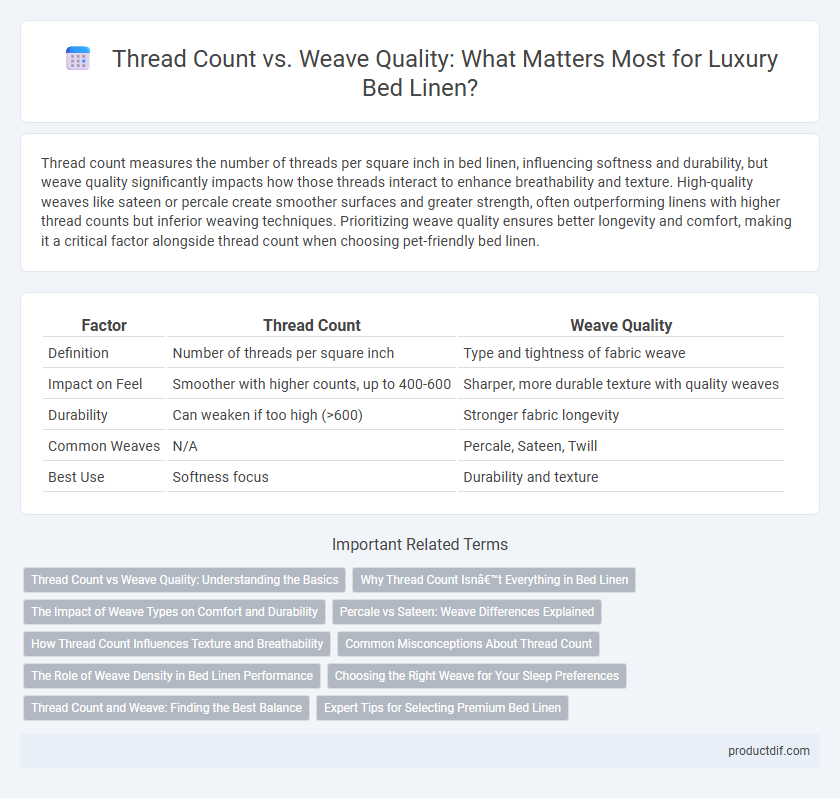Thread count measures the number of threads per square inch in bed linen, influencing softness and durability, but weave quality significantly impacts how those threads interact to enhance breathability and texture. High-quality weaves like sateen or percale create smoother surfaces and greater strength, often outperforming linens with higher thread counts but inferior weaving techniques. Prioritizing weave quality ensures better longevity and comfort, making it a critical factor alongside thread count when choosing pet-friendly bed linen.
Table of Comparison
| Factor | Thread Count | Weave Quality |
|---|---|---|
| Definition | Number of threads per square inch | Type and tightness of fabric weave |
| Impact on Feel | Smoother with higher counts, up to 400-600 | Sharper, more durable texture with quality weaves |
| Durability | Can weaken if too high (>600) | Stronger fabric longevity |
| Common Weaves | N/A | Percale, Sateen, Twill |
| Best Use | Softness focus | Durability and texture |
Thread Count vs Weave Quality: Understanding the Basics
Thread count measures the number of threads woven per square inch of fabric, serving as an indicator of softness and durability, but it does not solely determine bed linen quality. Weave quality, including patterns like percale, sateen, and twill, impacts the texture, breathability, and strength of the fabric more significantly than thread count alone. High-quality bed linen combines an optimal thread count with superior weave techniques to ensure comfort, longevity, and a premium feel.
Why Thread Count Isn’t Everything in Bed Linen
Thread count measures the number of threads per square inch, but it doesn't guarantee superior bed linen quality because weave type significantly influences texture and durability. Sateen weaves offer a smoother, silkier feel despite lower thread counts, while percale weaves provide crispness and breathability that high thread counts alone can't ensure. Prioritizing weave quality over thread count results in bed linens that are more comfortable, durable, and suited to individual preferences.
The Impact of Weave Types on Comfort and Durability
Thread count measures the number of threads per square inch, but weave quality significantly influences bed linen's comfort and durability. Satin weaves create a smooth, luxurious feel ideal for softness and breathability, while percale weaves offer crispness and enhanced durability through a tight, plain weave. Twill weaves, with their diagonal pattern, provide a sturdy fabric that resists wrinkles and withstands frequent washing, balancing comfort and long-lasting use.
Percale vs Sateen: Weave Differences Explained
Percale and sateen are two common weave types in bed linen, each affecting thread count and fabric quality differently. Percale features a plain weave with a one-over, one-under pattern, resulting in a crisp, breathable texture ideal for warmer climates, typically with thread counts ranging from 200 to 400. Sateen uses a satin weave that passes the weft thread over multiple warp threads, creating a smoother, lustrous finish with a denser feel, often requiring higher thread counts between 300 and 600 to achieve its signature softness and durability.
How Thread Count Influences Texture and Breathability
Thread count significantly impacts the texture and breathability of bed linen by determining the number of threads woven per square inch; higher thread counts often result in smoother and softer fabric, enhancing comfort. However, exceptionally high thread counts can reduce breathability, trapping heat and moisture, which affects sleep quality. Weave quality, including techniques like percale or sateen, interacts with thread count to balance softness and airflow, optimizing bed linen performance.
Common Misconceptions About Thread Count
Thread count is often misunderstood as the sole indicator of bed linen quality, but weave quality plays a crucial role in durability and comfort. High thread count sheets can be tightly woven with lower-quality fibers, resulting in reduced breathability and a heavier fabric. True luxury bed linens balance an optimal thread count with superior weave techniques and premium materials to enhance softness and longevity.
The Role of Weave Density in Bed Linen Performance
Weave density directly influences bed linen performance by determining fabric durability, breathability, and texture. Higher thread counts combined with a tighter weave density enhance the linen's strength and softness, providing better comfort and longevity. Optimal weave quality ensures moisture-wicking properties and resistance to pilling, improving overall sleep experience.
Choosing the Right Weave for Your Sleep Preferences
Thread count measures the number of threads per square inch, but weave quality determines the fabric's texture and durability. Sateen weaves offer a silky, smooth feel ideal for those who prefer a luxurious touch, while percale weaves provide a crisp, breathable finish suited for sleepers who favor coolness. Selecting the right weave enhances comfort by aligning fabric characteristics with your sleep preferences.
Thread Count and Weave: Finding the Best Balance
Thread count, indicating the number of threads per square inch, often guides bed linen quality but does not solely determine softness or durability. Weave quality, the arrangement of yarns like percale or sateen, significantly impacts texture and longevity, providing different feel and breathability. Finding the best balance involves choosing a moderate thread count with a well-crafted weave to ensure comfort, durability, and enhanced sleep experience.
Expert Tips for Selecting Premium Bed Linen
Thread count is often touted as a key factor in bed linen quality, but weave construction plays a crucial role in durability and comfort. Experts recommend prioritizing tightly woven fabrics such as percale or sateen that balance thread count with weave density to ensure softness and longevity. Selecting premium bed linen involves assessing fiber quality alongside thread count and weave to achieve optimal breathability and texture.
Thread Count vs Weave Quality Infographic

 productdif.com
productdif.com